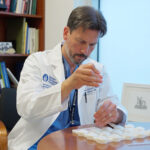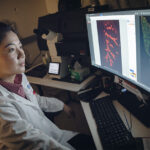Pioneering microbiome findings shed light on aspiration

When children have respiratory infections, clinicians tend to blame gastroesophageal reflux, based on the assumption that bacteria-laden stomach contents rise into the mouth and are then aspirated. As a result, clinicians often recommend a type of anti-reflux surgery called fundoplication to treat these infections. Yet, despite undergoing this procedure, many patients don’t improve.
A new study by Rachel Rosen, MD, MPH, and her colleagues in the Aerodigestive Center at Boston Children’s Hospital and the Massachusetts Institute of Technology sheds more light on this issue. The investigators hypothesized that the interactions between the lung and gastrointestinal microbiomes were more complex than previously understood and that patients with impaired swallowing — and therefore worse airway protection — may have the greatest degree of microbiome impairment.
Making use of the microbiome
To test this hypothesis, the aerodigestive team obtained bronchoaveolar lavage, gastric, and oropharyngeal samples from 220 children who were seen at Boston Children’s for evaluation of chronic cough. These samples then underwent DNA sequencing to determine their microbial makeup, or microbiome. The researchers also compared the microbiome from the lungs, oropharynxes, and stomachs of patients who aspirated based on videofluoroscopic swallow study findings and then looked at the interaction between swallowing abnormalities, reflux, and microbial disturbances.
Groundbreaking findings
The team found that lung, oropharyngeal, and gastric microbiomes overlapped in all patients. However, in children with aspiration, the lung microbiome more closely resembled oropharyngeal rather than gastric microbial communities, which explains why fundoplication is not effective in these patients: The microbial changes in the lung result from aspiration of oropharyngeal bacteria rather than gastric bacteria. In addition, the authors found that there are unique microbial signals in patients with impaired swallowing, and that these patients can be differentiated from patients with intact swallowing based on their microbiome. These findings also point to the possibility of one day identifying biomarkers for aspiration based on the presence of certain bacteria in both the lungs and the oropharynx.
“These results are exciting because we may be able to use the microbiome as a diagnostic tool to diagnose aspiration,” says Rosen. “In addition, we need to think beyond gastroesophageal reflux as a cause of respiratory infections in children with impaired swallowing.”
Learn about the Aerodigestive Center.
Related Posts :
-

Promising advances in fetal therapy for vein of Galen malformation
In 2024, Megan Ingram* of California and her husband were preparing for the birth of their third child when a 34-week ...
-

The hidden burden of solitude: How social withdrawal influences the adolescent brain
Adolescence is a period of social reorientation: a shift from a world centered on parents and family to one shaped ...
-

A toast to BRD4: How acidity changes the immune response
It started with wine. Or more precisely, a conversation about it. "My colleagues and I were talking about how some ...
-

A unique marker for pericytes could help forge a new path for pulmonary hypertension care
Pulmonary arterial hypertension (PAH) is a rare condition that’s difficult to treat. The hallmarks of the disease — narrowing of ...





